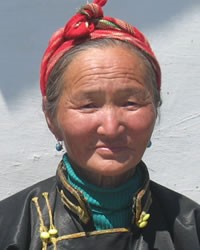The Durbet are a Western Mongol tribe. They are primarily located in the western part of Mongolia, near the border of Russia. In the early 1600s, most of their ancestors (the Oirat) left their homeland, Dzhungaria, which is now part of the Xinjiang region of China, in hopes of settling in the rich pastures of the northern Caucasus Mountains. They are one of four subgroups of the Oirats.
In 1771, the majority of the Oirat decided to move back to Dzhungaria in order to escape the Russian dictatorship. Those who stayed in Russia became known as the Kalmyk, which means "to remain." Of those who left Russia, only a small group survived the long and difficult journey back to Dzhungaria. Having arrived in the land of their ancestors, the surviving Oirat were accepted under Manchu rule and given pastures for grazing their herds. Their descendants are still found in western Mongolia, as well as in the Xinjiang region and Qinghai province of China.
The Durbet, like other Mongols, are known for their love of fine horses and horse racing. In addition to raising horses, most of the Durbet also raise cattle and sheep. Many of the Durbet live as nomads, and their lifestyle is one of seasonal migrations. Their dwellings are portable tents called gers or yurts, made of felt on lattice frames. Their diet includes millet, milk tea, dairy products, mutton, and kumiss, or fermented mare's milk.
Some of the Durbet have become settled farmers. Their principal crops include grains, corn, fodder grasses, mustard seed, sunflowers and melons.
The Durbet family typically consists of parents and their children. After marriage, the sons move into separate homes located near their parents. In farming areas, some Durbet still live in extended family units, which consist of parents, married sons and their families, and unmarried sons and daughters.
Marriage was formerly a symbol of adulthood among the Durbet. Marriages were arranged by the parents, and a zurkhachi (astrologer) was consulted about the compatibility of a bride and groom. Today, couples usually marry while they are in their early to mid-twenties. Sadly, divorce is becoming more common, and legal abortion is the principal means of birth control.
The typical Durbet dress includes velvet hats, loose fitted coats and heavily padded long pants. They often shave their heads, except for one small area in the back that is reserved for a pony-tail.
Oral historic poetry is an important part of Durbet culture. It is traditionally recited by a poet, accompanied by a two-stringed lute called a dombr. Favorite pastimes include storytelling, singing, archery and wrestling.
The Durbet, like other Mongols, were traditionally animists (believing that non-living objects had spirits) and shamanists (believing in an unseen world of gods, demons and spirits). The people depended on shamans (medicine men) to cure the sick by magic, communicate with the gods and control events.
In the late 1500s, the Durbet adopted Tibetan Buddhism. In the revolution of 1921, "Outer Mongolia" (present day Mongolia) attacked Buddhism as a superstition. Later, shamanistic festivals and Buddhist rituals were restricted. However, the shamans remained very influential. The obo, a heap of stones thought to be inhabited by local spirits, often serves as a site for performing various rituals.
The Durbet traditionally practiced "sky burial." This meant that the deceased was left in a field to be eaten by wild animals and carrion birds. Today, the dead are usually buried in community graveyards.
Medical facilities among the Durbet are inadequate. Limited water supply, poor hygiene, deficient diet and alcoholism are all common problems. Christian medical missionaries are needed to live and work among the Durbet, ministering to their physical as well as spiritual needs.
Pray that God will send Christian medical teams to live and work among these precious people.
Pray for the Mongolian Church to fund missionaries to go to the Durbet and other unreached peoples in their country.
Pray that God's church in Mongolia would grow in deeper discipleship and greater mission vision.
Pray for a spiritual hunger among the Durbet people to drive them to seek and find Jesus Christ.
Scripture Prayers for the Durbet, Dorwoten in Mongolia.
| Profile Source: Joshua Project |

























